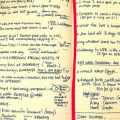Good Writing Tips

I don’t claim to be an expert, but I’ve been writing 1,000 words a day almost every day for the past 120 weeks. That’s the most important tip of all—to be a writer, start writing. You’ll figure out a lot of things along the way.
But for all of you overachievers out there, here are some other ideas that may help.
Move from the general to the specific. Here’s the idea, now here is how you apply it. Give people the concept and then tell them more about how they can use it. Travel is fun and meaningful; here’s how you can actually book a Round-the-World plane ticket. To stand out in life you have to be awesome; here’s what that looks like. Change the world by doing a, b, and c.
Get personal. This is the Penelope Trunk model: often imitated, but seldom to the level of the art form she’s made it. A lot of people copy Penelope’s tactics without relating them to a broader strategy. You have to have a strategy. She does it right; her imitators do it wrong.
Write for an audience of several. I think of about five people when I write. They’re all different, but I try to picture them and think, what would so-and-so think of this? Would he get it? Would she find it interesting?
If it “goes without saying,” you don’t need to say it. I hate reading that phrase… and when I discover it in my work, I hate it even more. Other overused writing phrases include: the jury’s out, think outside the box, it is what it is, and my two cents. Alas, I use them all once in a while.
Always answer the reason why. Why should someone care about what you have to say? Of course your friends and your parents care about what you think, but what about everyone else? You need a clear reason for the rest of the world to care.
Do the second edit later. It’s impossible (well, for me) to write and edit anything longer than an email without needing at least a short break. The longer the draft, the more of a break I need.
Print your work and proof it on paper. I used to write in longhand and transfer it to the laptop, which also helped. Now that I do this for several hours a day, every day, I write almost exclusively on the laptop.
Read everything aloud. There’s something about hearing your work aloud that causes you to notice things you miss when you read. On our annual review trip last December, Jolie read the entire AONC book manuscript out loud over the course of a week (1-2 chapters a day). I couldn’t believe how many mistakes and poor word choices we found! Keep in mind this was after I had been writing the book for six months, and after two complete edits. It was depressing… but hopefully now it’s better because we did it.
Get into the details! Don’t be vague. Provide more info, work it out, tell the whole story. This makes a huge difference. This is why J.D. Roth is such a role model to me. He always tells the whole story. The Yarn Harlot also does this well.
Take the time to do it right. Ramit told me about how he spends 12 hours writing a guest post for someone. Some people are surprised, but that’s how long it often takes! When I get an opportunity to write for a great outlet, whether online or offline, I spend a similarly long time on it.
Preempt objections. This is an important marketing strategy, but it’s also important in your writing. Build your case. If you’re trying to present a viewpoint, think about what the objections will be, then try to preempt them by addressing them (and often negating them) in your writing.
Take a stand. Contrary to conventional wisdom, readers want to know what you actually think. If consensus is overrated, so is neutrality. What bothers you, and what are you doing about it? Tell us.
These books are good: Art and Fear, The War of Art, On Writing, Bird by Bird, and The Elements of Style. But remember, if you want to write, it’s more important to just start writing.
***
Lastly, recognize that any creative act worth doing benefits from an ongoing process of continuous improvement. Writing is no exception. I don’t like everything I wrote in the first two years of the archives here. Next year I probably won’t like everything from 2010. I want my second book to be better than my first, and so on.
That’s just how it goes, and you can’t improve without getting something out there to start with. That’s why the first writing tip is the best: if you want to write, start right now and don’t stop.
What would you add to this list?
###
Image: Phil








49 Comments
Hi Chris,
Long time! I’ve been a bit quiet lately but I’m still here. 🙂
I would add, at the top of your list, read. Read a lot.
Its obvious that the more you read, the better your writing will be, but above that, reading good work from other people gives me an urge to write, specially when I read books in Portuguese (my first language)… sometimes I spend too much time without them, and as soon as I start reading a new book in Portuguese I just want to write straight away.. and it’s always better when you want to write rather than when you have to!
Great post Chris – these tips are just fantastic.
The first one (Go from general to specific) was something I learned the hard way. When I first started blogging, I intuitively (and incorrectly) wrote very high level, generalised stuff. Problem is, waxing philosophical like that lead me to say all that I had to say in just a handful of posts!
It was much, much easier to grow into a semi-prolific writer when I started chunking down into the details and treating each blog post as its own specific little (deep and narrow) niche.
Thanks for putting words around this. This gets my vote as one of your most valuable posts for fellow writers…
Love it. Will send off some emails with this URL. Also to add: Politics and the English Language by George Orwell.
Being a visual artist I haven’t really developed my writing skills to the extent that I would like so I have to say that these tips are most welcome. I think the two that made me really stop and think the most were “Always answer the reason why” and “Get into the details”. I’ll definitely be keeping these in my mind as I continue to write more. And as you pointed out, writing more is the key to improving.
Thanks Chris!
I am not very good at taking the stand, even though I realize that it’s important. Why write something if I don’t say what I think about it? I sometimes let my needs to be liked take the priority. But I am working on that!
Also, I like “Write from your heart”. The post I got most comments was also the one that is closest to my heart.
Etsuko
When I wrote for JD Roth at Get Rich Slowly, he constantly kept drilling it into my head that I needed more details and that my concepts were too vague. He’s an incredible writer, and the tips he gave me were some of the best I received since high school. One of the most important ones that I think about every time I write is to use more contractions. “I’ve” flows much better than “I have” and can make things sound much more personal.
Really enjoyed this post Chris, very useful.
Thanks for the heads up, Chris. This advice is so often repeated but so seldom followed. Perhaps someone more respected, like you, saying it will help it break through.
I know I’ll try.
I started an exclusively personal blog about nine months ago just to get in the habit of writing every day. I’m totally with you on building that habit. It’s some of the best advice. For writing… or anything.
Also, doing the NaNoWriMo challenge at least once can help with the writing part too. :>)
-Marshall Jones Jr.
Great article. I always battle between the sense of urgency (I want to push ‘publish’ NOW) and the need to review. This reminds me that the latter is best. Thanks!
I am in the midst of reading 279 Days to Overnight Success and I had decided to write 1000 words everyday now. The idea of explaining general concept and then the detail application should be a structure that I should follow now.
Have to come back top this page again later ! 😀
Love it. To be a great writer – start writing. Many people forget to take the first step!
I’d add: assume your editor is right.
For example, I just got comments back from my advisor on two dissertation chapters. He thinks my second chapter is off topic. So he suggested that I add a rationale for it. (Notice, too, how he didn’t just say 86 it. I like that he respects my choice for writing it.) My first reaction was, “I thought I explained why it’s there already.” I realized that it is there to me, but it isn’t obvious enough to someone else. It’s worth going from the assumption that it’s not clear, doing the work of (what I think of as re-) explaining it, and seeing where that leads.
Re: books on writing
Peter Elbow has several really good ones, too.
cheers.
I really enjoyed this post.
I’m a 23 year old (law) student, and I’m half-way through my studies. Now I have discovered that I think I want to be a writer. All tips are helpful! And I have saved so many books on writing to my amazon wishlist.
But I think the most important tips for anyone is to stop thinking and start writing. I have been captured in this trap for so long; all I can think about is how I’m going to write, what I’m writing about, which angle to chose etc. I never get to the writing part!
Thanks to you, I’m going to sit down right now.
Good topic Chris. Nothing to add but Kurt Vonnegut puts it well. In summary:
1. Find a subject you care about
2. Do not ramble, though
3. Keep it simple
4. Have guts to cut
5. Sound like yourself
6. Say what you mean
7. Pity the readers
I’ve heard “write for one person.” Stephen King calls this the Ideal Reader, and I’ve always had some trouble with that. Just one person? Good to hear that you think of several potential readers. I’ll give that a try.
A while back I purchased an Olympus digital voice recorder for interviews. I’ve started reading my drafts out loud into that and then listening to the recording (often while taking a walk). This definitely helps in the editing/polish phase.
A couple more books I’ve found helpful:
Walking On Water: reflections on faith and art (Madeleine L’Engle – also wrote A Wrinkle In Time series)
Writing For Story: Jon Franklin (great advice on breaking away from the traditional “outline”)
Some excellent suggestions there. Thanks, Chris.
LIke you said, Writers Write. And we’ll figure out a ton of things along the way. However, writers should be well-read, as well. However, trying to serve both of those masters at the same time is a recipe for disaster by either procrastination or losing your own voice. I’ve been teaching myself to focus on one thing at a time and it’s begining to pay dividends!
On the reading-to-write-better list I’d add Rand’s “The Art of Nonfiction.”
I’ll add a chime for reading the work aloud.
My fiance and I are both finishing the process of releasing our first books and we had a similar editing experience. Everything had been edited at least twice but when we read aloud we found a lot of small things that had been overlooked.
Fantastic post, Chris!
I think that feeling of not liking our prior work is a great indicator for judging how quickly we are improving. If our prior work is always our best work, we’re obviously not improving!
I’m curious, how long on average do you spend writing your 1000 words? Are those thousand words usually things that end up being published? And if not, how much effort do you put into ensuring proper grammar, best word usage, paragraph and sentence structure, etc.?
Love the concept of ”taking a stand”. Too much dilly-dally out there because we don’t want to offend or simply don’t want to commit. If we apply taking a stand, we may eventually eliminate the two following expressions from the English language that I find to be meaningless and counter productive: ”I think” and ”not really”.
Absolutely excellent post! I must get back to reading On Writing.
Thank you, as always. Your blog is a major motivation for me!
I still struggle with just forcing myself to write everyday. How does everyone else handle this? This post is so timely for me. I was just today looking around the web at different writing books, trying to decide which to peruse in my few daily minutes of free time. I keep seeing Chris mention “The War of Art” over and over, so maybe I’ll start there.
Andrea –
For those of us without real editors, this can be a tricky one. Especially if we create our own mental editor.
How do we know when to stop second guessing ourselves? What if the voice of that inner critic is just way too loud?
I’d be curious if you, anyone in the community here (or Chris) has thoughts on combating the bad side of the “internal editor”.
Chris, I just want to thank you for this, and all the amazing material on this site! I’ve learned so much from you already, and I’ve just scratched the surface of what’s here! As a beginning again blogger, I need all the tips I can get. Thanks for living your passion, and encouraging us to live ours.
Some very useful writing tips here Chris.
I just finished reading Zen in The Art of Writing(Ray Bradbury)…It really speaks to writing from your heart, among other things. I think that is something that can be forgotten among all the rules, and marketing efforts that come with the core act and art of writing from your soul.
Bird by Bird is also a great writing book. BUT I suffer from reading about writing, and am learning to read less, and write write write ;-> AGAIN…great post!
Find your voice. That comes with time.
Great post Chris – there are some good ideas that I want to apply to my cartoons. Currently I try to think up 10 ideas for cartoons everyday, and aim to average about 2-3 completed cartoons a day. Since starting on this pattern a while back it has now become a habit that I do automatically. Even if I’m not feeling so good, I find that if I can just get started the rest tends to follow. Because of this habit I find that I don’t have to put a ‘cartoon hat’ on, ideas just seem to come. Of course, doing something with the ideas is the main trick!
Hey Chris- Thanks for laying this out plainly.
And thanks too to all the other people who commented, guess we are all in this together, go figure.
Am in the middle (thought I was toward the end) of my second book. It’s a roadmap for creative action. I’m publishing myself first. I know this stuff inside and out, have volumes to tell people but need this basic book to be clear, concise, simple, applicable for everyone.
I am making myself nuts over here with the writing and editing, the second-guessing my audience, worried that I am making the tone inaccessible as I try to simplify it to make it accessible. Aieeee.
Personal fave? Do the second edit later. I need to write that on my hand in ballpoint, like we used to in school when we knew we’d forget something otherwise.
Great post and comments. Back to the book!
My suggestion – Get a team and be sure to use them.
People want to help, and especially if you are writing for a much wider audience, having others giving you feedback as you are writing can bring in needed perspective before its out and that sinking feeling is settling in.
I have a small but genuine group of beta readers who are about to get the current draft, before I die of asphyxiation caused by not being able to write…..
Hi Chris, There are several points here that have never occurred to me like printing out a draft post to proofread it or to read my writing out loud. You always have a unique and useful take on your topics. Thanks.
Hi Chris,
One of my favorite topics ever. I love writing and do it daily as well.
There are some great tips here. I have one more. As I frequently edit other people’s work, I also recommend adding “read more.” Not just the classics and your favorite writers, but any writing — the worse the better. I am fortunate that I receive submissions and a lot of unfinished work. The more writing mistakes I read, the less likely I am going to repeat the errors in my own writing. It is also helpful to see how a variety of people approach similar subjects with tone, voice and structure. I also recommend “The Art of the Tale” and/or “The Art of the Story.” Both are spectacular compilations of the best of international short stories
Devin
My two-cents:
Your neighborhood library likely has a lot of good works on writing for various mediums…as trite as it sounds, ‘practice does make perfect’…
I’ll be carving out a couple hours manana for this task…thanks for the reminder Chris!
@tclark
I’ve been fighting “well, I need at least an hour to do anything of consequence,” for a while. That excuse was really “I just don’t feel like dealing with this monster” in disguise. Mark Forster’s book “Get Everything Done” and his website with the directions for what he calls “Autofocus” have some good ideas along these same lines. The basic idea is open up the document or notebook or whatever you like to write on at least once every day. Simply start with that habit. Get yourself feeling comfortable with doing that. Give yourself credit for doing that. Tell yourself, “At the very least I’m just going to open the file/notebook/napkin.” If you feel like going further, go further and start writing. If you don’t feel like going further, don’t beat yourself up for it. Then move on to “I’m going to work at least 5 minutes on this.” Good luck!
@Peter Shallard
My advisor sees a fairly polished product when I finally get a chapter in, so most of the editing comes from me. The things that work best for me are:
a) Get something down no matter how stupid you think it is. You can always change it. If you have nothing down, you have nothing to work with.
b) When I get bogged down in “Everything Sucks!” I take a small break. Sometimes, I just have to leave it for the day and come back the next.
c) I keep asking myself questions and even rehash the same ideas multiple times in order to get to the breakthrough idea. What am I really trying to say? What do I like about what I wrote? What needs to go?
d) I write in a very casual manner as if talking to someone, then fix it up after I’ve got the ideas down.
e) I walk around my apartment talking out loud to myself. Works like a charm.
Hope that helps.
Really great tips Chris, thanks. The “read everything aloud” one is particulary spot-on. That little tactic has saved me from several blunders on my blog!
Thanks Chris for the reminder to write everyday! Always need to remember because I get do caught up in networking, emails and social media!
I also like the advice of writing to more than one audience, that makes me see more possibilities.
And I also agree about printing it out and proofing it! I always see something I missed when just looking at it online! Thanks!
The other thing to add to your great list is; write everyday or at least keep your head into it. That can mean reviewing or just laying down on the bed and allowing your inner mind(sub-conscious) to go over and over the subject you are currently working on. You have to keep a constant connection.
Chris — A great post, as always! I was wondering if you could answer a couple of questions related to writing everyday: Can you talk about your routine? Do you write first thing in the morning? How much time do you set aside for writing? For those of us looking to switch up our routine (or to start writing more), this would be really helpful.
Thanks again!
I love this post. I’ve been told for years, “If you want to write, you must write every day.” I never did. Now that I’ve started my little blog, I’m writing more than I ever have. I really want to become a better writer and the tips you named will help me with that.
My personal pet peeve is spelling errors. I guess with today’s spell check technology and having multiple editors, it’s not really an issue. But for a novice, it’s really something to check and double check.
I’m reading “A Writer’s Guide to Nonfiction” by Elizabeth Lyon and I’m enjoying it quite a bit.
Thanks Chris.
I can’t believe you know who the Yarn Harlot is! Are you a closet knitter?
@andrea
Thanks for the tips. I like the idea of tip E…. walking around talking to myself not only helps, but provides valuable entertainment for others too!
I liked many of your points here. Good post! One thing I disagree with is “Preempt objections.” Objections are what engage people. If you give readers no reason to respond, you’ve killed the conversation. I like to leave room for people to point out gaps or fill in what I left out. Martial arts without an opponent / sparring partner is no fun. In a real, organic exchange, we don’t speak in monologues. I think this applies to blogs as well. Let them be alive. Anyway, thanks for the post, and I’m sure you’ll see me around again soon.
The advice to be concrete never gets old. But it’s hard given that it…requires thinking. More thinking and focus per word, sentence and paragraph than busting something out that says not much of anything at all.
That’s why self discovery happens through writing, it forces clarity and reflection. Sometimes I wonder if that’s why I’m reluctant to write. I’m either scared of what I’ll find, or scared that I’ll find nothing at all!
“Write every day” is spot-on, too. A writing coach I know of once said (and I’m paraphrasing here): “Write every day. If you can’t write, edit. If you can’t edit, pick up your manuscript and walk around the room with it.”
In other words, whether you’re physically putting pen to paper or not, never let go of the fact that you’re a WRITER.
The three tips I liked the most were being detailed, tell them why and thinking of a few people and write for them.
All of these were a great reminder.
Excellent post, thoroughly enjoyed it.
Fantastic tips.
I definitely agree with one of the past comments, about reading and reading and reading. I constantly read. In fact, that is where I get a lot of my inspiration. But aside form reading, you have to take the time to recognize the nuances and subtleties in an author’s writing. You can’t just read a book and say, “That story was awesome! He/she is such a good writer!” Well, it may be true that the story is great, but what makes him a great writer? Maybe he or she is just a “big picture” kind of guy. Ha!
Anyway, enjoying the blog and keep up the good work.
I’ve been looking for something with solid blog writing tips and this finally helps! Thank you. I will continue to read more articles.
Most if not all publishing book companies will likely refuse to publish the book if they don’t see original handwriting.
Digital laptop notes dont count.
Personal inquiry.
Your comments are welcome! Please be nice and use your real name.
If you have a website, include it in the website field (not in the text of the comment).
Want to see your photo in the comments? Visit Gravatar.com to get one.